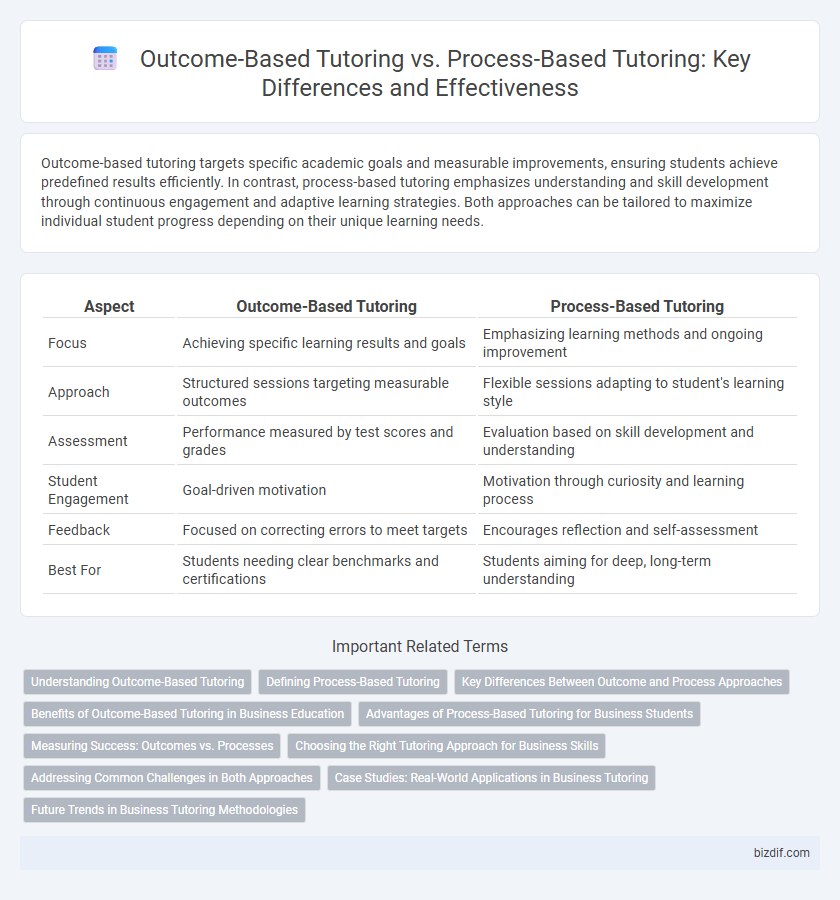Outcome-based tutoring targets specific academic goals and measurable improvements, ensuring students achieve predefined results efficiently. In contrast, process-based tutoring emphasizes understanding and skill development through continuous engagement and adaptive learning strategies. Both approaches can be tailored to maximize individual student progress depending on their unique learning needs.
Table of Comparison
| Aspect | Outcome-Based Tutoring | Process-Based Tutoring |
|---|---|---|
| Focus | Achieving specific learning results and goals | Emphasizing learning methods and ongoing improvement |
| Approach | Structured sessions targeting measurable outcomes | Flexible sessions adapting to student's learning style |
| Assessment | Performance measured by test scores and grades | Evaluation based on skill development and understanding |
| Student Engagement | Goal-driven motivation | Motivation through curiosity and learning process |
| Feedback | Focused on correcting errors to meet targets | Encourages reflection and self-assessment |
| Best For | Students needing clear benchmarks and certifications | Students aiming for deep, long-term understanding |
Understanding Outcome-Based Tutoring
Outcome-Based Tutoring centers on achieving specific learning goals, emphasizing measurable improvements in student performance and mastery of targeted skills. This approach uses clearly defined outcomes to guide instruction and assessment, ensuring tutoring efforts directly align with desired academic results. By focusing on result-driven strategies, Outcome-Based Tutoring enhances accountability and tailors support to meet precise educational objectives.
Defining Process-Based Tutoring
Process-based tutoring emphasizes the student's learning journey by focusing on developing critical thinking, problem-solving skills, and effective study habits rather than solely aiming for specific test scores or end results. This approach encourages continuous feedback and reflection, enabling learners to internalize concepts and adapt strategies for long-term academic success. Process-based tutoring prioritizes skill acquisition and cognitive growth, fostering deeper understanding and independent learning capabilities.
Key Differences Between Outcome and Process Approaches
Outcome-based tutoring prioritizes achieving specific learning goals and measurable results, emphasizing test scores and skill mastery as key performance indicators. Process-based tutoring focuses on the learning journey, promoting critical thinking, problem-solving, and learner engagement without solely concentrating on final outcomes. The fundamental difference lies in outcome-based methods targeting clearly defined objectives, while process-based approaches nurture continuous development and deeper understanding.
Benefits of Outcome-Based Tutoring in Business Education
Outcome-Based Tutoring in business education sharpens students' ability to meet specific learning goals, enhancing skill acquisition directly linked to market demands and professional competencies. This method ensures measurable progress by focusing on key performance indicators such as strategic decision-making, financial analysis, and leadership skills, which employers highly value. By aligning tutoring outcomes with real-world business challenges, learners gain a competitive edge through targeted knowledge application and improved job readiness.
Advantages of Process-Based Tutoring for Business Students
Process-based tutoring enhances critical thinking and problem-solving skills essential for business students navigating complex market scenarios. It fosters adaptability by encouraging active learning through case studies, simulations, and iterative feedback rather than solely focusing on exam results. This approach cultivates long-term retention and practical application of knowledge, empowering students to thrive in dynamic business environments.
Measuring Success: Outcomes vs. Processes
Outcome-based tutoring focuses on measurable results such as test scores, grades, and skill mastery to determine the success of learning. Process-based tutoring emphasizes the quality of learning activities, student engagement, and development of critical thinking over time. Evaluating success requires balancing tangible achievements with continuous improvement in learning methods and cognitive growth.
Choosing the Right Tutoring Approach for Business Skills
Outcome-based tutoring emphasizes measurable results and specific skill acquisition, making it ideal for businesses aiming to track performance improvements and ROI. Process-based tutoring focuses on developing problem-solving abilities and critical thinking through experiential learning, which fosters innovation and adaptability in dynamic work environments. Selecting the right approach depends on whether the business prioritizes quantifiable outcomes or long-term cognitive skill development.
Addressing Common Challenges in Both Approaches
Outcome-based tutoring emphasizes measurable academic goals but often struggles with student engagement and adaptability to individual learning styles; process-based tutoring addresses these by focusing on cognitive skills development and continuous feedback. Both approaches face challenges such as maintaining motivation, managing diverse learner needs, and ensuring consistent progress tracking through tailored assessments. Incorporating technology-driven analytics and personalized learning plans can mitigate these challenges, enhancing effectiveness across tutoring methods.
Case Studies: Real-World Applications in Business Tutoring
Case studies in business tutoring reveal that outcome-based tutoring sharply increases measurable performance metrics such as sales growth and client acquisition rates by focusing on specific goals. Process-based tutoring, favored in leadership development programs, enhances problem-solving skills and decision-making processes, which fosters long-term strategic thinking. Comparative analyses show businesses adopting a hybrid model often achieve both immediate results and sustainable professional growth.
Future Trends in Business Tutoring Methodologies
Outcome-based tutoring prioritizes measurable skill acquisition and goal achievement through data-driven assessment tools, aligning closely with evolving corporate performance metrics. Process-based tutoring emphasizes cognitive development and problem-solving strategies, integrating adaptive learning technologies that foster critical thinking and creativity in business environments. Emerging trends indicate a hybrid approach leveraging AI analytics to customize sessions, balancing tangible results with deep learner engagement for optimal professional growth.
Outcome-Based Tutoring vs Process-Based Tutoring Infographic

 bizdif.com
bizdif.com